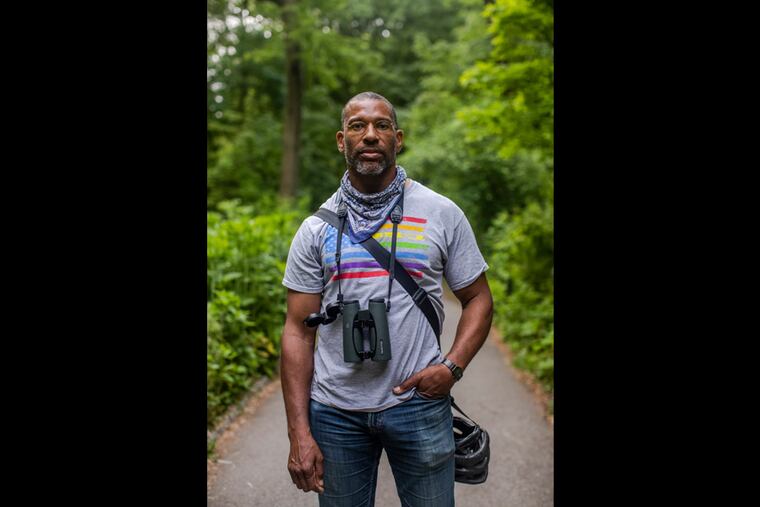The Great Outdoors isn’t always great for everyone | Helen Ubiñas
Nearly every day brings fresh, horrific examples of there not being a place, or activity, in which a person of color can participate in this country without the fear of being targeted or worse.

I have great memories of “the country” as a kid — the country being Upstate New York, or really any place with more grass than concrete, where my sisters and cousins and I could be semi-free of the watchful eyes of our parents.
I became a lot less enamored as a teenager when I signed up for an outdoors class at John F. Kennedy High School in the Bronx for reasons I can’t remember. I also don’t recall anyone telling me what was suitable gear for my first skiing trip, and realizing only after losing a ski mid-slope that already-skintight jeans all but turn into tourniquets when wet.
Somewhere before or after that outing — the mind really does try to shield you from traumatic experiences — there was the take-the-city-kids-into-the-woods camping trip also sponsored through the school. Mid-rainstorm, we realized the donated tents leaked, and after a miserable night, I learned that I was super-allergic to grass. I rushed to the pay phone after the bus dropped us off to call my father to come get me, only to realize I couldn’t see the numbers, my eyes nearly swollen shut.
“Can you please help me dial?” I asked a person who I could only sense was nearby.
Those were my childhood experiences with the Great Outdoors.
So years later, when a friend asked if I wanted to go hiking with her and her dad, I have no idea why I said yes. And I would never have predicted that it would become a near-two-decade tradition with her and another friend who would later join us. Our annual all-girl hikes have seen us through work and home drama, through the loss of loved ones, and for one of us, the arrival of twin grandchildren that sent us speeding back home before our hike even began so she wouldn’t miss their births. (She didn’t.)
Over the years, I’ve come to cherish the incomparable feeling of lightness, freedom, and unbridled joy as we shed all other obligations while we huff and puff toward a mountaintop, usually in the White Mountains.
Except there is something I’ve never been able to completely shed, and that’s the increasing realization that these spaces are overwhelmingly white.
Whites made up 74% of the 151.8 million people in this country who participated in outdoor activities, according to an 2019 Outdoor Foundation report, though national and local groups are trying to change this.
If you spend any time in the outdoors, it’s hard to miss.
I thought about that after watching the viral video of a white woman calling the police on a black man in Central Park on Memorial Day. There to bird-watch, Christian Cooper asked a woman to leash her dog in an area where that’s required, and that’s when she unleashed her entitlement and privilege.
“There’s an African American man threatening my life,” she tells police on the phone. “Please send the cops immediately.”
Nearly every day brings fresh, horrific examples of there not being a place, or activity, in which a person of color can participate in this country without the fear of being targeted or worse — even when it’s white people inventing ways in which they feel inconvenienced or threatened.
But trust me when I tell you that there’s an extra bite when it happens at a time or place that you’ve allowed yourself to put down your guard, when you’re in your happy place, enjoying yourself or minding your own business, or both.
When you’re just trying to breathe.
The reality of the world around you crashing into your special or sacred space can sour not just the moment but the entire experience and environment.
And long after it’s over, it lingers.
Cooper, a Harvard-educated, New York City Audubon Society board member, and pioneer of queer representation in comics, told the Washington Post: “I am not going to participate in my own dehumanization.”
But how will he not think about that incident every time he’s enjoying Central Park?
Last summer, I watched a lifeguard at a pool attempt to throw out two black teenagers because someone complained they were being too rambunctious, although they were no more boisterous than the white kids horsing around. When the guard attempted to justify his selective discipline by claiming they were unsupervised — one of their parents had briefly left to get food — I all but declared myself their auntie.
My heart broke when the father returned and one of the kids pleaded with him to leave. I don’t know if he told his father what happened; I only heard him say he was done swimming.
I really hope he meant just for that day.
My friends and I had to cancel our hiking trip this year because of the coronavirus. But I will be out there as soon as I can, putting one foot in front of the other as I climb up that mountain to claim my space.